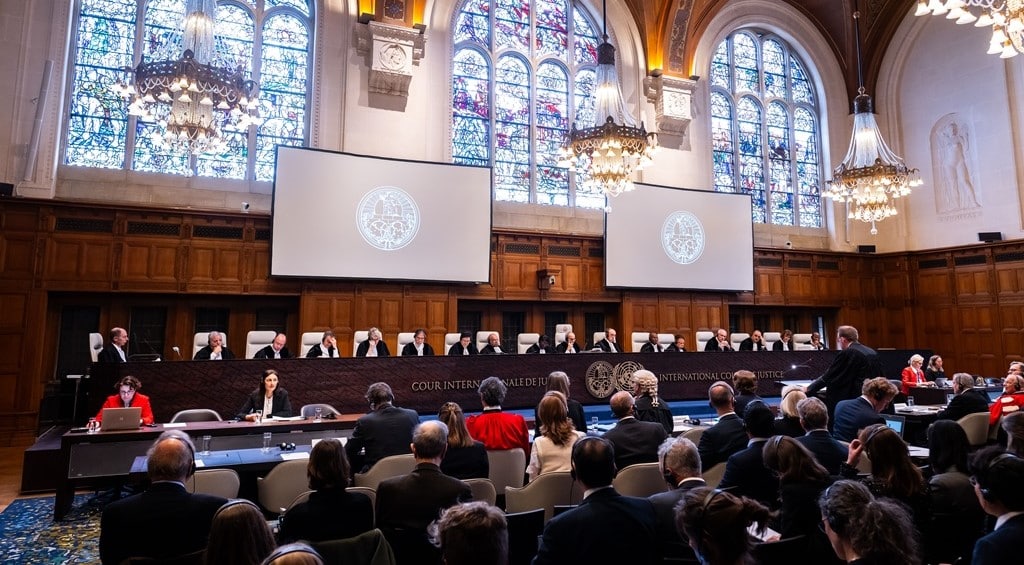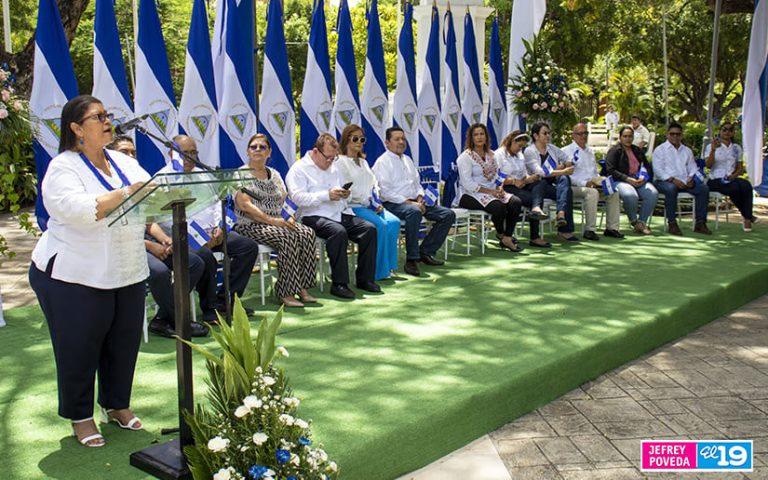30 de agosto 2023

ICJ Rules Against Nicaragua's Request For Germany to Halt Arms Sales to Israel

PUBLICIDAD 1M
PUBLICIDAD 4D
PUBLICIDAD 5D
Displaying the Nicaraguan flag on houses and cars has been grounds for imprisonment since 2019. Minister of Education now invites to "wave the flag"

Lílliam Herrera Moreno, Minister of Education, speaks during the launching of activities for the national holidays. Photo: Taken from El 19 Digital
The official inauguration of independence day celebrations in Nicaragua brought some surprises. The first surprise was the decoration at the event: dozens of blue and white flags and no red and black FSLN flags, something unusual at government activities. Another surprise was delivered by the Minister of Education, Lílliam Herrera Moreno, who urged the population to "fly" the national flag in "every house."
According to the official, the idea is to fly the flag in "all our educational environments, as well as squares and parks."
"Outside every house we must fly the blue and white flag of Nicaragua," said the minister during the inauguration of activities to commemorate the 202nd anniversary of the signing of the act of independence of Central America from the Spanish crown and the 167th anniversary of the Battle of San Jacinto.
Herrera Moreno's appeal –the first of its kind in more than five years– clashes with a reality imposed by the regime since 2019: No citizen can raise the Nicaraguan flag in homes or display it in vehicles, under penalty of imprisonment. The only exception is pairing the country's flag with a red-and-black flag of the Sandinista Front.
The prohibition is part of the repressive policy to annihilate all opposition movements. The national flag became a symbol of civic protest and unity against the dictatorship. In 2018, the blue and white colors identified the self-convened movement and the massive demonstrations against the Daniel Ortega-Rosario Murillo regime.
Since 2019, the Police and paramilitaries have rounded up opponents who take to the streets carrying a flag, as well as the street vendors who sell them.
For merchants and shopkeepers in the Huembes and Iván Montenegro markets in Managua, the education minister's promotional announcement won't boost their sales. "People don't buy flags any more because they're afraid," complained one of the vendors who spoke to CONFIDENTIAL on the condition of anonymity.
"Now we only sell the flags that schools ask for. Nobody buys flags to put up in their homes. It is very dangerous," the vendor says.
A merchant at the Iván Montenegro market explains that selling flags "is no longer good business" because "they don't sell."
"I've had that package [of flags] since last year, and I still haven't sold even half of them," adds the merchant.
The flags in most demand for school activities are the plastic flags which cost, depending on the size, between six and ten córdobas each (between $0.16 and $0.27). The cloth or satin flags are also sold for between 50 and 100 córdobas (between $1.37 and $2.73), depending on the size.
There are not many stalls selling flags in either of the markets. Merchants say that many want to avoid "inspections" by the Police or the Managua Municipal Markets Corporation authorities, as have happened in the past.
In 2020, police officers went through the markets to "inspect" the flags being sold. In some cases, they seized them because they allegedly included "a rainbow that resembles a barricade made of paving stones."
The best known case was that of the shopkeeper Tania Isabel González Solís, who was dragged by police officers from San Carlos, Río San Juan, on August 25, 2020. It happened when the police tried to snatch a roll of Nicaraguan flags that she was selling in a hardware store she owned. The video of her arrest went viral on social media.
"Look how they're taking me away for selling flags. How ridiculous! The drugs I'm carrying are –look– flags. Free our country!" shouted the woman, while she was arrested by at least eight agents. Opponents and activists described the incident as a "criminalization of patriotic symbols" by the ruling FSLN.
Another shopkeeper was arrested in November 2018 for selling flags on the street. He was subsequently charged and convicted for illegal carrying and possession of weapons and hindering public services.
Also in 2018, Professor Humberto Hernandez was harassed and cited by the Police. His crime: riding his motorcycle through the streets of the city of Camoapa, in Boaco, carrying a blue and white flag.
This article was originally published in Spanish in Confidencial and translated by our staff.
PUBLICIDAD 3M
Confidencial es un diario digital nicaragüense, de formato multimedia, fundado por Carlos F. Chamorro en junio de 1996. Inició como un semanario impreso y hoy es un medio de referencia regional con información, análisis, entrevistas, perfiles, reportajes e investigaciones sobre Nicaragua, informando desde el exilio por la persecución política de la dictadura de Daniel Ortega y Rosario Murillo.
PUBLICIDAD 3D